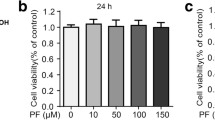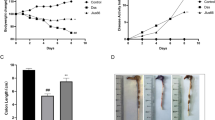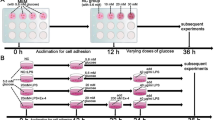Abstract
Objective
To investigate the effect of Yinlai Decoction (YD) on the microstructure of colon, and activity of D-lactic acid (DLA) and diamine oxidase (DAO) in serum of pneumonia mice model fed with high-calorie and high-protein diet (HCD).
Methods
Sixty male Kunming mice were randomly divided into 6 groups by the random number table method: normal control, pneumonia, HCD, HCD with pneumonia (HCD-P), YD (229.2 mg/mL), and dexamethasone (15.63 mg/mL) groups, with 10 in each group. HCD mice were fed with 52% milk solution by gavage. Pneumonia mice was modeled with lipopolysaccharide inhalation and was fed by gavage with either the corresponding therapeutic drugs or saline water, twice daily, for 3 days. After hematoxylin-eosin staining, the changes in the colon structure were observed under light microscopy and transmission electron microscope, respectively. Enzyme-linked immunosorbent assay was used to detect the protein levels of DLA and DAO in the serum of mice.
Results
The colonic mucosal structure and ultrastructure of mice in the normal control group were clear and intact. The colonic mucosal goblet cells in the pneumonia group tended to increase, and the size of the microvilli varied. In the HCD-P group, the mucosal goblet cells showed a marked increase in size with increased secretory activity. Loose mucosal epithelial connections were also observed, as shown by widened intercellular gaps with short sparse microvilli. These pathological changes of intestinal mucosa were significantly reduced in mouse models with YD treatment, while there was no significant improvement after dexamethasone treatment. The serum DLA level was significantly higher in the pneumonia, HCD, and HCD-P groups as compared with the normal control group (P<0.05). Serum DLA was significantly lower in the YD group than HCD-P group (P<0.05). Moreover, serum DLA level significantly increased in the dexamethasone group as compared with the YD group (P<0.01). There was no statistical significance in the serum level of DAO among groups (P>0.05).
Conclusions
YD can protect function of intestinal mucosa by improving the tissue morphology of intestinal mucosa and maintaining integrity of cell connections and microvilli structure, thereby reducing permeability of intestinal mucosa to regulate the serum levels of DLA in mice.
Similar content being viewed by others
References
Smith DK, Kuckel DP, Recidoro AM. Community-acquired pneumonia in children: rapid evidence review. Am Fam Physic 2021;104:618–625.
Dong F, Yu H, Wu LQ, Liu TG, Ma XY, Ma JJ. Exploring association between gastrointestinal heat retention syndrome and recurrent respiratory tract infections in children: a prospective cohort study. BMC Complement Altern Med 2016;16:82.
Zhang W, Yu H, Shang JB, Liu TG, Ma JJ, Gu XH. Association between dietary habits and recurrent respiratory infection in children: a case-control study. J Tradit Chin Med Sci (Chin) 2015;2:105–110.
Wang J, Ma XY, Yu H, Zhang NN, Wang Y, Wang ZD. Four experimental cases of using Yinlai Decoction to treat heat accumulation in the lung and stomach (intestine) of children. Jiangsu Tradit Chin Med (Chin) 2022,54:47–49.
Dong F. To explore the association between gastrointestinal heat retention syndrome and pneumonia in children [Dissertation]. Beijing: Beijing University of Chinese Medicine; 2016.
Shi JF. To explore the association between pediatric pneumonia and Yang-ming endogenous heat [Dissertation]. Beijing: Beijing University of Chinese Medicine;2011:60.
Yang QR, Wu YM, Zhang JH, Zhang JT. Relationship study of elderly patients with serious pneumonia and intestinal mucosal barrier function. Pract J Cardiac Cerebr Pneumal Vascul Dis (Chin) 2013;38:2854–2858.
Dominic-Luc W. Tests of intestinal mucosal hyperpermeability: many diseases, many biomarkers and a bright future. Clin Gastroenterol 2019;40–41:101636.
Wu Q, Ye H, Zhu YZ, Guo M, He XX, Zheng XB. Protective effect of baicalin against LPS-induced intestinal injury. China J Chin Mater Med (Chin) 2013;38:2854–2858.
Wang HX, Ye Y, Xu PP. Effect of Chinese medicine on the lung and intestinal function injury from influenza virus. J Tropic Dis Parasitol (Chin) 2019;17:143–148.
Li GG. Factor of pneumonia combined with stomach intestine functional disturbance in infants. Chin J Appl Clin Pediatr (Chin) 2008;23:1471–1472.
Li X, Wei XZ, Sun Y, Du J, Li X, Xu Zh. High-fat diet promotes experimental colitis by inducing oxidative stress in the colon. Am J Physiol Gastrointest Liver Physiol 2019;317:G453–G462.
Liu TG, Yu H, Zhang W, Lv GK, Zhen JH, Li XF. Study on the mechanism and effect of Yinlai Decoction on the intestinal mucosal mechanical barrier in dyspepsia pneumonia mice. China J Tradit Chin Med Pharm (Chin) 2014;27:2472–2475.
Yang W, Ying J, Xiao BQ, Huang YK, Ou HY, Liang HC. Establishment and evaluation of experiment models with gastrointestinal dysfunction caused by dexamethasone in rats and mice. Chin Pharmacol Bull (Chin) 2011;27:1174–1177.
Li G, Wang WB, Ma ZF, Zheng FC, Tian JX, Zhao CJ. Clinical observation of Dachengqi Decoction modified enema in the treatment of postoperative inflammatory bowel obstruction in children. Chin J Exp Form (Chin) 2019;25:76–81.
Xie Q, Gan HT. Controversies about the use of serological markers in diagnosis of inflammatory bowel disease. World J Gastroenterol 2010;16:279–280.
Zhang FQ. Effect of lipopolysaccharide and dexamethasone stress on intestinal mucosa barrier function in broiler chickens [Dissertation]. Jinzhong: Shanxi Agricultural University;2015:45.
Author information
Authors and Affiliations
Contributions
Yu H and Gu XH designed this study; Wang YH, Zheng ZA, Wan YX, Xu JN, Bai C, and Liu TG performed the experiment; Liu TG, Hao Y, Mao YQ, Qiu ZJ, and Wu J provided experimental guidance; Wang YH, Yu H, Kong TC, Cui LJ, and Shao YJ wrote the manuscript.
Corresponding author
Additional information
Conflict of Interest
The authors declare that the research was conducted in the absence of any commercial or financial relationships that could be construed as a potential conflict of interest.
Supported by Innovation Team and Talents Cultivation Program of National Administration of Traditional Chinese Medicine (No. ZYYCXTD-C-202006)
Electronic supplementary material
11655_2023_3697_MOESM1_ESM.pdf
Supplementary material to “Yinlai Decoction Protects Microstructure of Colon and Regulates Serum Level of D-Lactic Acid in Pneumonia Mice Fed with High-Calorie and High-Protein Diet” written by WANG Yun-hui, YU He, LIU Tie-gang, et al published in Chinese Journal of Integrative Medicine (DOI: https://doi.org/10.1007/s11655-023-3697-x)
Rights and permissions
About this article
Cite this article
Wang, Yh., Yu, H., Liu, Tg. et al. Yinlai Decoction Protects Microstructure of Colon and Regulates Serum Level of D-Lactic Acid in Pneumonia Mice Fed with High-Calorie and High-Protein Diet. Chin. J. Integr. Med. 29, 714–720 (2023). https://doi.org/10.1007/s11655-023-3697-x
Accepted:
Published:
Issue Date:
DOI: https://doi.org/10.1007/s11655-023-3697-x




